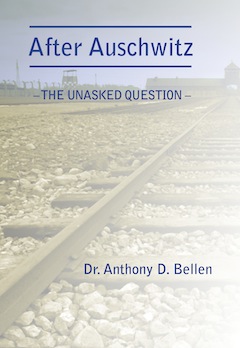Many people have read an enormous amount of Holocaust literature during their lifetime. The stories are tragic, horrifying, heartbreaking. No matter how many books you read, or films and documentaries you see, you can never come to terms with the fact that such evil exists in the world.
But Dr. Anthony D. Bellen’s book – After Auschwitz: The Unasked Question (Mazo Publishers, 2016) – is different. He is a clinical psychologist specializing in post-traumatic stress disorder, moral resilience and restorative processes. He lives in Israel, is a husband, father and grandfather, and has retired from the Israel Prison Service, where he headed the department of treatment and rehabilitation. He now works with people who have suffered trauma.
 The unasked question in the book’s title is: “Do you remember any positive experience from your time in the concentration camp? Was there ever a positive interaction – a brief moment of happiness in the midst of that evil abyss?”
The unasked question in the book’s title is: “Do you remember any positive experience from your time in the concentration camp? Was there ever a positive interaction – a brief moment of happiness in the midst of that evil abyss?”
Bellen has chosen six survivor interviews for this book from 56 he conducted with Holocaust survivors in 2004 for his doctoral research study in the department of criminology at Bar Ilan University. The six gave him permission to share their stories, although their names have been changed for privacy.
I don’t think I will ever forget any of these stories. Motti’s moment of happiness occurred on the day of liberation from Theresienstadt, when a Russian soldier stood on a wooden crate and called out in Yiddish: “Has anyone seen my mother?” For Ida, it was finding a friend from her village – Miryam. For Eva, it was finding her hairbrush from home that her brother managed to give her before he was gassed in Majdanek. Reuven’s moment of happiness came in a swimming pool with two friends. Ya’acov’s joy came from meeting the love of his life, Sonya, in a laundry in Brintz. Sarah’s positive memory came from a Christmas in Bromberg, where she and some friends “performed” a song for the SS and later for the inmates of the camp.
These were just miniscule moments of happiness, gone in a flash, but powerfully remembered decades later – and never shared before.
The book concludes with a bibliography and references, as well as the seven questions Bellen asked each interviewee. These remarkable stories may help other people with different traumas find the strength to overcome them. They may even change your perceptions and understanding of your own life.
Dvora Waysman is a Jerusalem-based author. She can be contacted at dwaysman@gmail.com or through her blog dvorawaysman.com.

